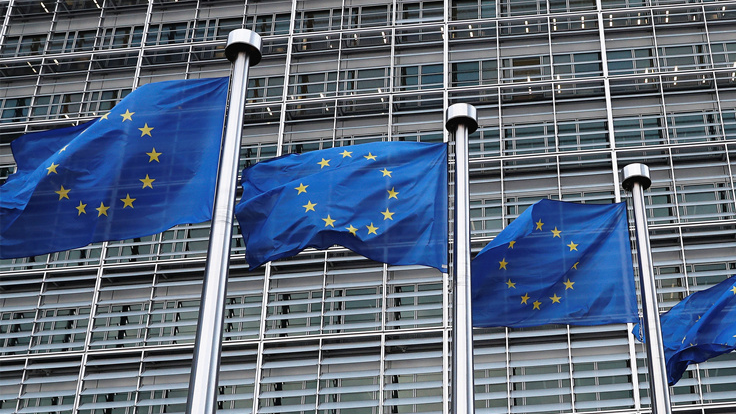
European Union flags flutter outside the EU Commission headquarters in Brussels, Belgium, March 8, 2018. /Reuters
European Union flags flutter outside the EU Commission headquarters in Brussels, Belgium, March 8, 2018. /Reuters
Editor's note: Bradley Blankenship is a Prague-based American journalist, political analyst and freelance reporter. The article reflects the author's opinions and not necessarily those of CGTN.
Yet again, the European Union is facing an uncertain future that could see member states retract from Brussels as the clash between national and bloc-level law intensifies.
In the past several days, the EU has issued warnings to Poland and the Czech Republic that EU funds may be withheld due to a variety of concerns, while both Poland and Hungary's national pandemic recovery plans have yet to even be approved.
In the case of Poland, the EU is threatening about $150 million in cohesion funds from some provinces over "LGBT-ideology free zones," which have fueled discrimination though do not have any clear legal designation.
As far as pandemic-related aid is concerned, both Poland and Hungary have yet to have their plans endorsed by the EU finance ministers over rule of law concerns. Among the concerns are alleged misuse of funds, though certainly other member states are concerned about threats to civil society and general EU norms.
So bad is the situation in Hungary apparently that economist Daron Acemoglu recently argued for Hungary's outright expulsion from the EU while setting its sights on Poland. "The longer the EU continues to treat Hungary like a normal democracy, the more damage it will do to its own brand," he concluded.
More recently, both countries refused to sign on with the newly established European Public Prosecutor's Office (EPPO) that is designed to investigate and prosecute crimes involving EU funds, raising concerns over the primacy of EU law and the transparency of funds.
Similarly, in the Czech Republic, although the country's national recovery plan was endorsed by EU finance ministers, funds may be withheld because the country has failed to shore up its lack of proper conflict of interest controls.
On August 30, it was reported that the European Commission had issued a stern warning to the Czech Republic that such subsidies might be withheld if conditions weren't met.
The warning specifically asks the Czech authorities to compile a list of all public officials that control companies, plus any trust funds and their recipients, as well as any subsidies they may have received by September 8. Just two days before the deadline, the government asked for a postponement, admitting that it failed to address conflict of interest concerns in time.
Of course, this falls in the context of a previous conclusion of an audit by the commission published in April that found Prime Minister Andrej Babis still maintained effective control of his business conglomerate, Agrofert, and thus has conflict of interest.

Demonstrators are seen during a protest rally demanding resignation of Czech Prime Minister Andrej Babis in Prague, June 4, 2019. /Reuters
Demonstrators are seen during a protest rally demanding resignation of Czech Prime Minister Andrej Babis in Prague, June 4, 2019. /Reuters
Speaking in regards to his case that was recently turned over to the EPPO, Babis has firmly denied the allegation, saying that he put the company into trust funds in a way that complies with the Czech law. Even if true, this is an obvious maneuver designed to put national law above EU law.
In his re-election campaign kickoff over the weekend, Babis told a crowd that his opposition would hand over power to Brussels and disband the Visegrad Group (V4) made up of Hungary, Poland, the Czech Republic and Slovakia, vowing to "protect our national interests, living standards, our culture."
Leaders from each of these countries at odds with Brussels have repeated a similar mantra, making clear that they see national law and sovereignty as more important than EU law and closer integration with the bloc.
But it's unclear whether simply booting any one of these member states, as Acemoglu argued in his column, would actually solve the EU's problems because it could be argued that booting EU member states for the first time just after the UK voluntarily left the bloc would probably do more to accelerate the demise of the European project rather than keep it together since it could lead to a domino effect, which many feared would be the case with Brexit.
At the same time, it's unfair to blame Central European governments for the EU's failing when even high-level EU officials have admitted that, during key moments, the EU has failed to deliver as promised.
That's not to say that the European project itself has failed or is undesirable, but rather a fact. As a non-federal bloc of independent European nations, the EU is handicapped – perhaps in a way that warrants even further integration, which is what I happen to believe – in its ability to respond to, for example, the ongoing COVID-19 pandemic, refugee influxes or economic crises.
The limits of what the EU is actually capable of doing and whether or not this limited function could be considered supreme, even if that's what member states had agreed to initially, is the perennial contradiction of European politics – and Central European member states are pushing this contradiction to its limit.
(If you want to contribute and have specific expertise, please contact us at opinions@cgtn.com.)

